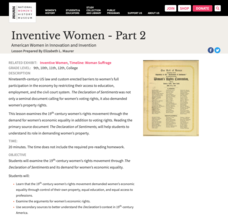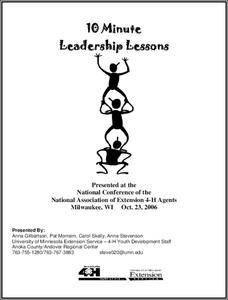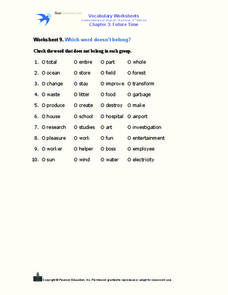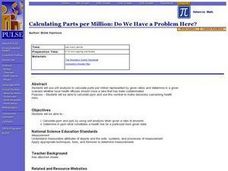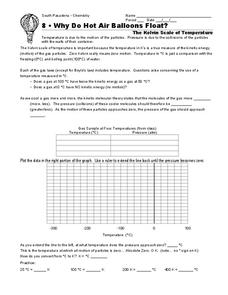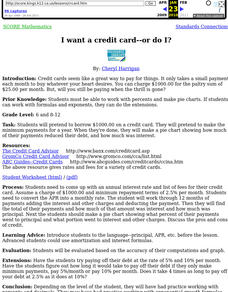PBS
“He Named Me Malala”: Understanding Student Activism Through Film
Malala Yousafzai has become the face of social activism. After watching He Named Me Malala and short student-made films about what young people can do to become instruments of change, class members reflect on what it means to be an...
National Park Service
Weather Patterns of the Pacific Ocean
How do oceans affect weather patterns? Learners define vocabulary associated with dew point, topographical lifting, condensation, and formation of clouds and precipitation as they explore the weather in the Pacific Northwest. They also...
NOAA
Why Should I Care?: Show How Increased Carbon Dioxide Makes the Ocean More Acidic
How does a change in pH affect the ocean ecosystem? Scholars explore the idea by making an acid-base indicator in part seven of the 10-installment Discover Your Changing World series. First, they explore impacts of carbon dioxide in...
Space Awareness
Seasons Around the World
Why does Earth experience summer, fall, winter, and spring? Using an informative demonstration, learners see how the angle of the sun on Earth and the rotation of Earth determine the seasons. Scholars work in pairs to learn that the...
National Woman's History Museum
Inventive Women - Part 2
The Declaration of Independence was published in 1776. The Declaration of Sentiments and Resolutions, modeled after the Declaration of Independence, was drafted and read by Elizabeth Cady Stanton at the Seneca Falls Convention in 1848....
eNet Learning
10 Minute Leadership Lessons
Forty pages offer 21 lessons to encourage leadership among kindergarten through eighth-grade scholars. Hands-on activities use the experiential learning model while exploring personal traits, getting to know peers, teambuilding,...
American Museum of Natural History
Finding Fossils
How does one go about finding fossils? Find out with an informative webpage that looks at the digging process, showcases rocks and common fossils, helpful tips, and a list of archeological do's and don'ts.
K20 LEARN
The Sirens: Is It a Bird or Is It a Fish?
Fish, fowl, foul fish, or foul fowl? Just what is a siren? Young scholars listen to a video clip and draw what they imagine when they hear the word "siren." After watching several videos depicting sirens, class members read "The Sirens'...
Curated OER
Auxiliary Verbs Exercises
In this gap fill activity, students fill in the blanks to sentences with do, does, doesn't, don't, am, is, are, or I'm. Students complete 45 sentences.
Curated OER
Present Unreal Situations: strategizing with hypothetical statements
In this hypothetical statements worksheet, students choose the correct the phrases in the sentences about what they would do hypothetically. Students complete 8 problems.
Curated OER
Classification of Words and Ideas
In this classification activity, learners pick the words that do not belong, make up the title for groups of words, and choose the title for the group of words. Students complete 3 activities.
Curated OER
Total English Upper Intermediate: People and Their Personalities
In this can do statements worksheet, students practice the phrases it's time, I'd rather, and I'd better as they respond to 20 questions that include sentence starters and vocabulary to describe characteristics of people in certain...
Curated OER
Worksheet 9: Which Word Doesn't Belong?
In this words that go together activity, students analyze a group of four words and determine anything they have in common. Students check the word that does not belong in each group.
Curated OER
ESL: Present Simple Exercises
In this ESL present simple learning exercise, students fill in blanks to correctly complete both positive and negative sentences, add "do" or "does" to complete sentences, answer short answer questions using appropriate pronouns and...
Curated OER
Mind Over Matter: How Does the Brain Work
Students research previous attempts by scientists to discover the ways in which the brain works, design and conduct an experiment to illustrate current research and present their findings to the class.
Curated OER
What Do You Want to Do?
This short story activity can be a good way to have learners practice comprehension and test preparation skills. While the passage is short, the 9-question activity can help students cement their test taking abilities.
Curated OER
Math - Does It Add Up? Applying Arithmetic Operations to Solve Everyday Problems
In this story problem worksheet, student find ten math problems in the story, write the problems down and say what type of calculation it was. Students also complete 12 computation problems.
Curated OER
What Does Time Have to Do with it?
Students investigate time. In this investigative lesson, students run through an obstacle course using standard timers. They record the time and apply this knowledge to problems in math. Students record their predictions, and graph...
Curated OER
Investigation - What Does 1,000 Look Like?
Second graders determine what 1,000 items look like. In this math investigation lesson plan, 2nd graders collect 1,000 items and determine the best way to count them by tens and hundreds. They can use stickers on notecards to count to...
Curated OER
Calculating Parts per Million: Do We Have a Problem Here?
Students calculate ppm and ppb by using unit analysis when given a ratio of amounts.
They determine in ppm what constitutes a health risk for a particular toxin given data
and whether local health officials should close a lake...
Curated OER
b or d: What do you see?
First graders often mix up the letters b/d, making them pronounce words incorrectly because they are identifying a b or d when they should be pronouncing the opposite letter. They are exposed to the two letters in a variety of ways...
Curated OER
Does that Sound Right to You?
Ninth graders are introduced to the components of compressional and transverse. They practice answering speed problems involving different mediums that waves travel trhough and then review the wave PowerPoint. They then visit physics...
Curated OER
Why Do Hot Air Balloons Float?
In this gases worksheet, high schoolers read about the Kelvin scale of temperature, they answer 3 fill in the blank questions about the relationship between temperature and pressure and they plot the temperature and pressure of gas...
Curated OER
I want a credit card--or do I?
Students pretend to borrow $1000.00 on a credit card. They pretend to make the minimum payments for a year. When they're done, they make a pie chart showing how much of their payments reduced their debt, and how much was interest.
Other popular searches
- Do Does and Did
- Does and Do
- Grammar Do and Does
- Using Do or Does
- Verbs Do and Does
- Esl Do Does
- Do Does Grammar
- Do Does Questions
- Does or Do
- Do Does Practice
- Esl Do Does Game
- Do, Does,did






